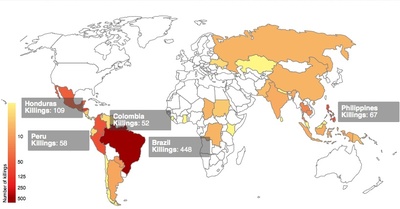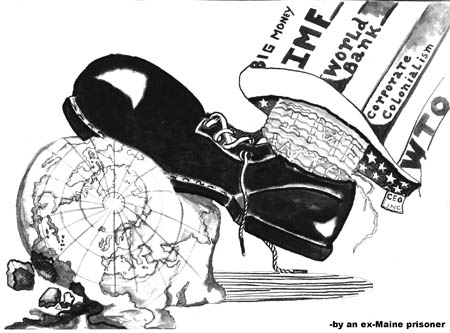
Revolutionary Ecology Website Review
Revolutionary Ecology (RE) is a new website that appeared in 2014. We welcome its appearance as the Maoist movement is in great need of a dedicated cell to address our current ecological crisis. We promote a cell structure for the Maoist movement in the First World, with cells focused on specific projects or localities. MIM(Prisons) is a cell focused on the U.$. prison system. We need a cell (or cells) that are focused on the struggle against the destruction of our environment just as badly. As the RE comrades point out in many articles, these are problems of dire urgency. They are also problems that threaten First World youth directly, potentially connecting them to the interests of the majority of humynity. This website is a good addition to the arsenal of educational tools for communists working to build a movement to overthrow imperialism.
The organizers of RE describe it as “a collaborative project that seeks to popularize Marxism within the environmentalist and animal liberation movements.” They go on to explain: “We are quite literally faced with two options: Communism or annihilation.” In the article, “What Would Socialism Mean for the Environment”, this is further explained: “Whereas capitalism involves productive relations of exploitation sustained toward the circular end of profit, socialism involves the democratic control over the means of production as part of the rational and increasingly egalitarian satisfaction of people’s wants and needs. Implied in such rational and democratic production is the inclusion of ecological regeneration and co-dependence as regulative economic principles.” In other words, instead of relying on the almighty invisible hand, socialism is about humynity taking conscious control of our collective destiny and organizing ourselves in a way to best serve the interests of all humynity. As should be obvious by now, these interests overlap greatly with preserving the natural systems that we live in and depend on.
The article “Capitalism’s Steady March Towards Irreversible Ecological Tipping Points” describes how capitalism is moving humynity rapidly towards tipping points that will be devastating for the Earth, including the deforestation of the Amazon, while discussing the inability of single issue groups and government regulations to stop this process. Much of the website’s content brings Marxist analysis into the ecological discussion, as with the article “Lake Michigan Oil Spill: Capitalism and Nature” which explains the role of commodities and money in the context of humyn’s relations with nature. And we are reminded of the importance of internationalism in the revolutionary ecology struggle through articles about South African trade unions and First Nations, among others.
In response to the Deep Ecology platform, one article proposes a
Revolutionary Ecology Platform:
- The well-being and flourishing of human and non-human life are intimately related. The flourishing of non-human life is generally of direct and indirect utility to humans, and vice versa.
- Richness and diversity of non-human life can contribute to utility for humanity at large. Thus, it should be promoted as such.
- Real wealth is utility or the ability to satisfy human wants and needs. The source of all wealth is two-fold: nature and human labor. It is in the long-term interest of a majority of humanity to steward biodiversity and ecological well-being (along with other elements of nature).
- Alienation from and the subjugation of nature is in the vital interest of a small proportion of humanity: the ruling classes. Increasingly under capitalist-imperialism, less real wealth (i.e., human utility) is produced in proportion to overall economic activity and at greater cost to human and non-human life.
- Ecologically unsustainable economic activity is inherent to capitalist-imperialism, whereby economic activity must expand even as much of it is tertiary and adds no real wealth in terms of the satisfying basic wants and needs.[sic] Abolishing such parasitic economic activity and reassigning it to restoring the natural element of wealth would aid in re-establishing the basic link between human and non-human life and provide for the flourishing of both.
- The whole structure of society needs to be changed. Only revolution – the seizure of power away from one set of classes by another – can create the necessary conditions for such a transformation. Any such revolution, if it is to be successful, must advance the interests of the most exploited and oppressed sections of humanity, not merely the privileged subjects of neo-colonial imperialism.
- A total ideological change of reconnection between human and non-human life will not fully take place until the basic structure of society (i.e. the mode of production) has been transformed into one of democratically producing long-term utility instead of profit. Nonetheless, the ideological sphere and subjective forces are a leading variable component where class struggle is carried out.
- Those who adhere to the above points must get organized to make revolution possible.
Point 5 is of particular importance for drawing the logical connections between Maoism and ecology. Many in the First World who are concerned about ecology are disgusted by the over-consumption of their peers. One example of the extremes this takes in rich countries has been circulating on the internet recently, exposing Amerikans in rural areas who are customizing their big diesel trucks to be less fuel efficient and spew out more pollution, while these excessive polluters are explicitly ridiculing and targeting people who drive more fuel efficient cars. While this is one example of the labor aristocracy taking capitalist values to ridiculous extremes, it is not the individual decisions of the consumer class that fuel the destruction of the natural world. Car culture was built by capitalist planners who developed and marketed suburbs and lobbied for state-sponsored roads. The focus on GDP, the stock market, and other economic indicators are an obsession in the First World that the majority have joined in on, with no thought to the fact that consumption must be reduced in First World countries in the creation of an ecologically sustainable system. But it is not the rural truck drivers who are the biggest obstacle to change, it is the very logic of capitalism itself, which requires ever-expanding production, markets and circulation. This system is backed up by the biggest, most ruthless militaries in the world today.
Nikolai Brown touches on over-production within capitalism in
h
article on e-waste, “Not only does the inherent focus on the
realization of surplus value engender ‘planned obsolescence,’ a global
division of labor enables the flow of resources necessary for the
propagation of disposable electronics. True to the fashion of
capitalism, by producing toxic e-waste on such a widespread basis, its
two requisites, labor-power and the natural environment, are
increasingly degraded.”(1) This article introduces us to the concept of
ecological unequal exchange: “the transfer of natural resources
to the First World from the Third World, and the return of pollution and
waste to Third from the First World.” As ecological crises advance, this
is a concept that deserves much attention in connection to the economic
unequal exchange that occurs under imperialism.
While we don’t
have any fundamental disagreements with the principles proposed by RE
above, we find their discussion of Deep Ecology idealist in its critique
of Maoism’s (and other socialist countries’) environmental history. The
article “Deep Green Maoism?” criticizes the history of socialism for its
record on “environmental degradation and species destruction” without
offering concrete facts on what is being critiqued. No doubt all
socialist societies to date, including the Maoist countries, had much
room for improvement around environmental protection. But we should not
issue blanket critiques from a position of hindsight and idealism. For
their day the Maoists advanced the environmental movement further than
any previous struggle by overthrowing imperialism and building a society
that aimed to put an end to oppression of people. In the process they
set the masses free to solve farming sustainability problems creatively,
and develop both farming and industry to more efficiently meet the needs
of the people. These are critical first steps towards living
harmoniously with the environment. And we can assume that as dialectical
materialists, these socialists would have continued to improve and build
an understanding and practice regarding the importance of environmental
preservation, had those societies not been taken over by bourgeois
elements from within the party.
One of the first things we try to teach to new comrades is the difference between idealism and materialism, and that materialism means comparing actual practices. When we compare Chinese socialism to the Soviet Union we see improvements in the overall political approach, which translated into better science and ecology. And when we compare both socialist countries to the capitalist countries, the socialists were industrializing in ways that were much friendlier to humyn workers and the rest of the environment. While we cannot make a comprehensive comparison here, we will provide some large-scale examples that indicate the advances of these real world examples of socialism over what was happening in capitalist countries at the time (and even today).
One Amerikan correspondent in the Soviet Union wrote in 1942, “Moscow has also the most scientific garbage disposal in the world. All the waste of this great city of more than 4,000,000 people is first used in ‘biothermal processes’ which heat large ‘greenhouse farms’ from underground. When the garbage and sewage is thoroughly rotted in this quite odorless manner, it is then used as a fertilizer for ordinary farming. This amazing development got no advertising whatever. I merely chanced upon it when I visited a farm.”(2) Decades later in northern China, “cadres, peasants, workers, and technicians experimented for ten years with utilizing industrial waste waters. Now the city’s daily 400,000 tons of sewage is processed to fertilize and irrigate 12,930 hectares of farmland. … Reciprocally, agricultural wastes such as cottonseed shells, corncobs, sugar-cane residue, and animal viscera become raw materials for developing commune-owned industries. … Decentralization and multipurpose use of wastes have, besides integrating industry and agriculture, been used to control industrial pollution. Like the relocation of factories, pollution control is generally coordinated on the local level.”(3)
Local, self-sufficient agricultural production was a key to successful socialist development in Mao’s opinion. This had more to do with class and economics, but reinforced and enabled ecologically sustainable practices. In discussing the balance between the foreign and native and the large, medium and small scale production, Mao wrote, “At the present time we have not proposed chemicalization of agriculture. One reason is that we do not expect to be able to produce much fertilizer in the next however many years. (And the little we have is concentrated on our industrial crops.) Another reason is that if the turn to chemicals is proposed everybody will focus on that and neglect pig breeding. Inorganic fertilizers are also needed but they have to be combined with organic; alone they harden the soil.” (4) Aside from pigs, humanure (or “night soil” as they called it) was a major source of organic fertilizer that utilized local resources on hand while simultaneously dealing with the problem of humyn “waste” similar to the Soviet example above. The safe and efficient use of humanure was greatly accelerated under socialism. Under capitalism, in 2014, this resource is disposed of as a waste, and the movement away from synthetic fertilizers and pesticides is still very small.(5)
Guided by the popularization of the scientific method to serve production, the Chinese also developed bacterial fertilizers at the local level. This is something that has gained a lot of attention in India in recent decades as the problems of over-dependence on synthetic fertilizers are becoming more pronounced. A report by Science for the People from 1974 describes the process of culturing the fertilizer, which is “reported to help crops absorb nitrogen, to protect them against more than thirty-two bacterial diseases, and to promote speedier seed germination and a shorter growing period.” The report states that, “Such small factories producing microbial products seem now to be common in the Chinese countryside.” They report on the process by which this commune studied bacterial fertilizers and has since taught it to about 20 other communes. “Similar processes of face-to-face contact and exchange appear to be exceedingly important in the transmission and popularization of science in China. Because such exchange generates little or no printed material, western observers, who tend to believe that all scientific communication of any note eventually reaches print, are likely to overlook what appears to be a vast network of informal scientific exchange in the Chinese countryside.”(6)
An author on revolutionaryecology.com argues that “…the environmental problems associated with the first world-wide wave of socialism were due to a lack of foresight and scientific knowledge about ecology, holdover culture from capitalism and semi-feudalism, and the partial impact of the theory of the productive forces.” The socialists of the 1900s had only as much foresight and scientific knowledge as existed at that time, and holding them to the standards of knowledge available today is idealism. Further, we know that the Maoists aggressively attacked the theory of productive forces and undertook the Cultural Revolution to fight capitalist culture. Sure, once these battles were won the revolution in all aspects would advance further, but this is not a basis for a 20/20 hindsight critique of the Maoist environmental practice in the socialist countries of the mid-1900s. We know that some practices in Maoist China would not be undertaken today, with the current state of the environment and the knowledge we have of effects of these practices. But that does not constitute reason for this critique any more than we would criticize China for failing to use computers to advance socialism before computers were available.
The article argues further “…it is this same understanding on the unity
between people and nature which was either missing or gravely misapplied
during the socialism of the last century.” Socialism “neglected to treat
nature as part of and necessary to people. That is not to say that
socialism treated the natural world and other species in terms other
than of humyn utility, but that it did so in an often ill-conceived and
short-sighted manner.” Here again we ask for concrete examples of
socialism’s failure in this regard, which should have been corrected
based on information available at the time. In farming areas the
communes in China were acutely aware of their dependence on nature as
essential for survival.
The article goes on to say: “In short,
an ecologically informed Maoism offers the chance to build a ‘socialism
of a new type’ for the 21st century which seeks to resolve the
contradiction between people and their natural environment as much as
the contradictions between people themselves.” As humynity’s ecological
understanding expands, socialism will utilize this knowledge and it will
do so without the barriers presented by capitalism. Humyn knowledge and
scientific understanding is constantly expanding. We find it misleading
to say that “a new type” of socialism is needed to address ecological
problems.
Aside from these Revolutionary Ecology Platform issues, we have a few smaller disagreements with the website. First there is a question of setting a bad security example by including a Facebook plugin so that people can “like” the website via their persynal Facebook accounts. This means the website is pushing people to expose themselves publicly as supporting RE. Unfortunately, this is information now available to the state, and individuals who may be new to activism (plus some blissfully ignorant experienced folks) will think they are helping the movement by “liking” the website only to expose themselves as targets for state repression just as they deepen their political line and involvement. Even at the level of random readers, we should always promote good security practices, both as a point of keeping our comrades safe and as an educational point about the repression the so-called democratic state of Amerika will unleash against those who threaten the imperialist system.
RE does not provide much information for readers on how to get involved. They do solicit participation of writers for the website, and the site links to other websites that are generally anti-imperialist and/or Maoist, or have good resources for Maoists (Kersplebedeb), and some of these other websites provide a forum for broader activism. But as a friendly suggestion we’d encourage the organizers of RE to make it easier for newly interested readers to take some anti-imperialist action if they don’t want to become writers for the site. Ecology is an appealing topic for white youth, and more must be done to pull those serious about real solutions to environmental destruction into the revolutionary movement. We look forward to more ecologists stepping up to build a powerful and active revolutionary ecology organization.












